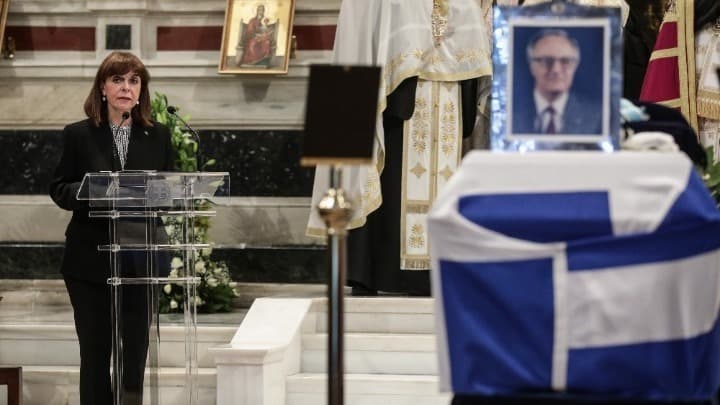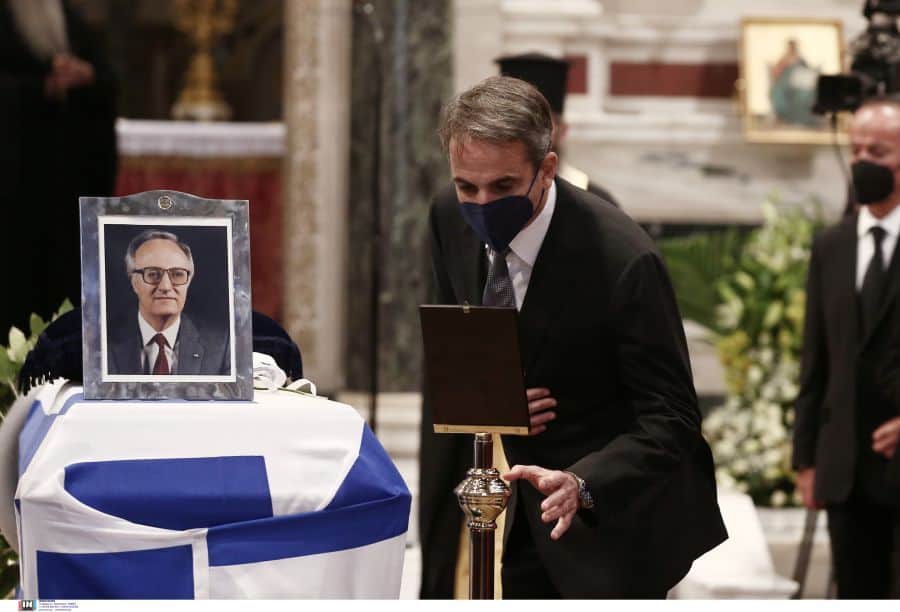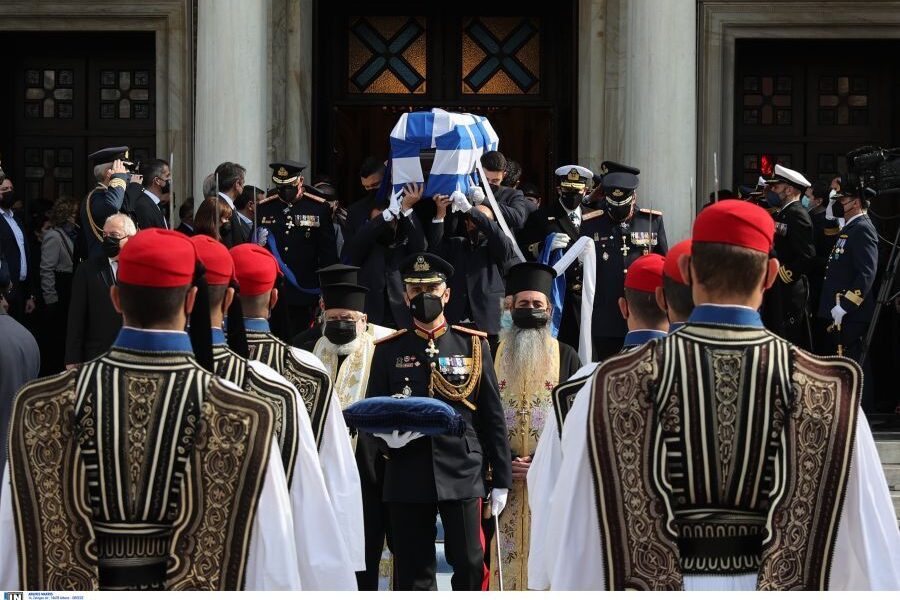Former Greek President Christos Sartzetakis was laid to rest with full state honours in Athens “as a minimum tribute to his excellent services to the people, the country and the nation” yesterday Monday (7/2).

The funeral at the Athens Cathedral was attended by the state and political leadership of the country, including the current president of the Hellenic Republic Katerina Sakellaropoulou, the leadership of the armed forces and the judiciary, as well as friends, co-workers and family.

The burial, held at the Athens 1st cemetery, was restricted to the immediate family due to Covid restrictions and the family’s own wishes.
Eulogies were read out by President Sakellaropoulou, Supreme Court President Maria Georgiou and University of Piraeus Professor of Public-sector Law Theodoros Panagopoulos.
Sakellaropoulou noted that his life had been inseparably linked with important moments in Greece’s history and that his work as a magistrate investigating the Lambrakis case in the troubled decade of the 1960s had made him a figure of international renown.
Sartzetakis passed away last Thursday at the age of 93

RESOURCE | ABOUT CHRISTOS SARTZETAKIS
Christos Sartzetakis was a Greek jurist and a supreme justice of the Court of Cassation, who served as the President of Greece from 1985 to 1990.
Sartzetakis was born in Neapoli, Thessaloniki, on 6 April 1929. His father, who was serving as a Gendarmerie officer in Thessaloniki, where he met his mother, was a Cretan, having been born in Kandanos, Chania, while his mother, who was born in Sklithro, Florina, was a Greek Macedonian.
He entered the Law Faculty of the University of Thessaloniki in 1946, and received his degree in 1950, after which he practised law in Thessaloniki. In 1954 he received his license to practice law after successfully completing the bar examination.
LEGAL CAREER
In November 1955, Sartzetakis was named Justice of the Peace. A year later, he became a magistrate of the Court of First Instance. He was the unyielding prosecutor in the sensational case of the assassination of the left-wing member of Parliament (and ‘doctor of the poor’) Grigoris Lambrakis, committed on 22 May 1963 in Thessaloniki by right-wing extremists. Lambrakis had called for Greece to disarm and withdraw from NATO. Over half a million people attended his funeral. Despite obstruction of justice by his superiors, Sartzetakis doggedly pursued his investigation to the end. He succeeded in convicting the police officers involved in the murder; they were later rehabilitated by the Greek military junta of 1967-1974.
The circumstances of the Lambrakis investigation was the theme of the well-known 1966 novel Z by Vassilis Vassilikos, and Sartzetakis was portrayed by Jean-Louis Trintignant in the novel’s 1969 film adaptation by Costas Gavras.
IMPRISONMENT
After the Lambrakis prosecution, Sartzetakis left for Paris on a state-sponsored educational leave to study comparative law at the Faculté de Droit et des Sciences Économiques de Paris and the Centre Universitaire des Études des Communautés Européennes. Immediately following the coup d’état of 21 April 1967 by George Papadopoulos, he was called back to Athens by the military junta. Along with 29 other magistrates, he was discharged by a “Constitutional Act” from all his legal functions on 29 May 1968. He was twice arrested, and imprisoned for almost a year until he was released on 19 November 1971 under mounting international pressure. During his captivity, he was tortured by the Greek Military Police.
RESTORATION OF DEMOCRACY
In September 1974, after the toppling of the dictatorship and the restoration of the democracy in Greece, Sartzetakis was completely rehabilitated. In the following years he became chairman of the Court of Appeal and finally, in October 1982, a member of the Court of Cassation. Sartzetakis became a fellow of several international legal societies. He also wrote several legal and political studies.
PRESIDENCY
The atmosphere just prior to the 1985 presidential elections was particularly unstable politically and the media of the time and the political parties considered the re-election of Konstantinos Karamanlis as President of the Republic as certain. It was then that the Prime Minister Andreas Papandreou proposed the name of Sartzetakis to succeed Karamanlis, a judge who had not been involved in politics. On 10 March 1985, immediately following the public announcement of this decision, Karamanlis resigned in the face of PASOK’s unexpected rejection of his re-election and because of his opposition to Papandreou’s recently announced plans to reform the 1975 Constitution and transfer the few executive powers from the President of the Republic to the Prime Minister. Speaker of the Hellenic Parliament Ioannis Alevras took over as acting President of Greece.
The first vote in the Greek parliament took place on 17 March, in which Sartzetakis obtained 178 votes. The second vote was held on 23 March and he obtained 181 of the deputies. That vote was controversial as the ballot papers were of different colors, with Sartzetakis’ being blue and the others white, causing a violation of the secrecy of the vote. It was not until the third vote, which was tense, held on 29 March, for Sartzetakis to be elected the new president to a 5-year term thanks to the vote of the 180 deputies of PASOK and the Communist Party. Shortly thereafter, he issued a televised message in which he called for unity, reaffirming that “our country is too small to support the luxury of national divisions”.
He was sworn in on 30 March in a ceremony boycotted by the 112 deputies of the conservative opposition, who did not attend, alleging that the vote was unconstitutional because the acting Greek president Alevras, who was then the Vice President of the Parliament, was allowed to vote.
[Wiki]

